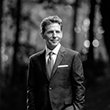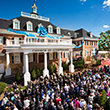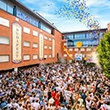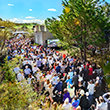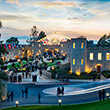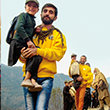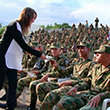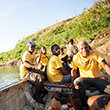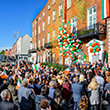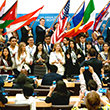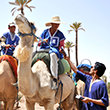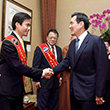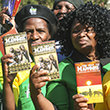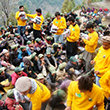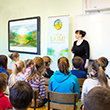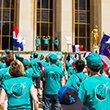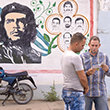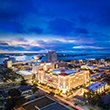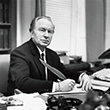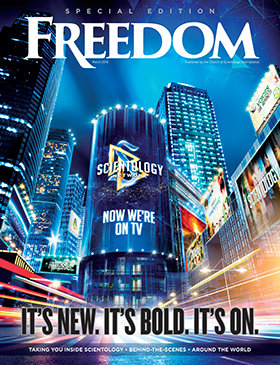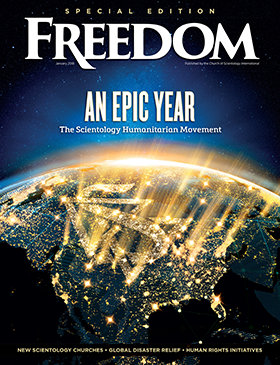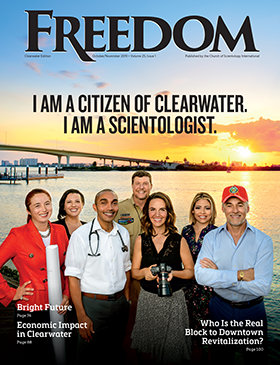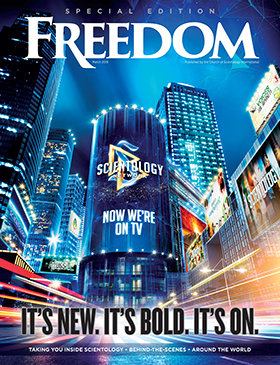When people need help, an array of social betterment programs are nearby and ready.
This was a turbulent year: Homicides spiked in America’s cities and people died by the tens of thousands from heroin and prescription opioids. Earthquakes, fires and floods destroyed the lives of countless families and conflict continued to decimate countries. Countering this onslaught of woe, the Church of Scientology, its members and myriad community partners eased the burdens of people who suffered, aided those in need and delivered hope to everyone touched with Church-sponsored, humanitarian programs.
Education drives nearly all of the world’s progress. So teachers, mentors, social workers, law enforcement officers, community activists and leaders in more than 100 nations set out in 2016 to teach and empower as many people as possible to lift society out of a dangerous slide.
100 million people
United for Human Rights, an international not-for-profit initiative headquartered in Los Angeles, educated 100 million people around the world about the 30 rights expressed in the Universal Declaration of Human Rights—the document adopted by a majority of nations in 1948 to help prevent a recurrence of the atrocities of World War II. United for Human Rights has partnered with 1,500 groups and organizations to distribute the Universal Declaration in 192 countries.
192 countries
By educating individuals on their innate human rights, including the film The Story of Human Rights, 30 public service announcements and comprehensive educator tools, United for Human Rights and its companion program, Youth for Human Rights, have managed to improve people’s mindset and to change national policies. In Mexico, the country’s constitution now includes the Universal Declaration of Human Rights, in part due to the campaign tirelessly carried out by participants in Youth for Human Rights.
180 such laws passed to date
In another global human rights endeavor, the Citizens Commission on Human Rights (CCHR), founded by the Church of Scientology in 1969, is the world’s foremost mental health watchdog. CCHR, now with more than 250 chapters in 34 nations, has diminished psychiatric abuses dramatically. Participants employ CCHR’s array of documentaries, media, publications and exhibits to educate officials and members of the public, and to see that crimes are prosecuted and legislation is passed to protect citizens—with more than 180 such laws passed to date.
Education is also the essence of the Church-sponsored The Truth About Drugs campaign. Spearheaded by the Foundation for a Drug-Free World, it’s the largest nongovernmental drug information and prevention initiative anywhere. The Truth About Drugs materials have reached 200 million people worldwide.
25% decrease in drug abuse
Through a documentary film, 17 public service announcements, school lesson plans and 14 Truth About Drugs booklets describing commonly abused drugs, the campaign instills young people with facts, so they can make their own decisions. As a senator in the Italian Parliament said, “I want to congratulate you on the major role you played in bringing about a 25 percent decrease in drug abuse in our country. … I know you won’t consider your work done until the youth of our country are able to decide for themselves that a life can be lived without drugs.”
However, for people who succumb to the dangers of drugs and either end up addicted or in prison, L. Ron Hubbard, Scientology Founder and humanitarian, found solutions. Narconon, the nonreligious program based on those solutions, treats addicts as human beings who have a problem, not as entities with chronic diseases. Addicts are carefully led through a non-medical withdrawal process, then guided through a detoxification program that uses nutrition, exercise and sauna to remove drug residues that drive cravings. Participants then take courses in life skills, gaining tools to deal with the pressures that led to drug use in the first place, and to help them remain healthy and drug-free.
Yet if people’s bad life choices land them in prison, there’s also Criminon, which addresses not only drug problems that led to incarceration, but restores to offenders the key to living a life free of criminality—their self-respect.
117 million books
To that end is The Way to Happiness—the secular, common sense guide to better living authored by Mr. Hubbard that lays out 21 precepts in easy-to-comprehend language. Its constructive principles and worthwhile values spread as a calming influence across the world: by the end of 2016, more than 117 million books are in circulation, in 114 languages. Coupled with a complete book-on-film, 21 public service messages and educator tools, just one documented result in the wake of education is a decline in violence and crime rates.
Of course, as Mr. Hubbard recognized, the key to avoiding drugs and crime—and to succeeding at nearly every aspect of life—is to become educated. Applied Scholastics, a non-denominational organization that consists of more than 1,000 groups in 72 countries, dramatically improves students’ chances to become educated, productive adults by utilizing Mr. Hubbard’s Study Technology, which teaches people how to learn so they can become proficient in any walk of life.
Beyond these answers is the program that embodies the Church’s religious social mission, the Scientology Volunteer Ministers (VMs). The motto of the VMs is, simply, “Something can be done about it.” The program comprises an array of tools to that end—from how to better communication, handle conflicts and overcome study problems, to how to improve organization and spiritually relieve illness and injury. Mr. Hubbard created the VM program as a vanguard in interfaith efforts to offer a hand to those in need, regardless of circumstances, location, race, creed or ethnicity.
1,000 organizations
When natural or man-made disasters demolish people’s best-laid plans, Volunteer Ministers provide assistance and help them to rebuild their lives. The program has grown into one of the largest independent international relief forces in the world. The Scientology Disaster Response Team now collaborates with more than 1,000 organizations and has served at every major disaster this century.
As productive as 2016 has been, the outreach and good works of the Church’s global humanitarian force will certainly continue to grow next year and every year thereafter.



